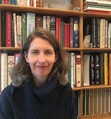Lory Widmer Hess's Blog, page 4
November 10, 2024
Nonfiction November
Before I started blogging, I hardly read nonfiction. Now I can’t imagine my reading life without it. During the last decade, which has been tumultuous for both my outer and inner life, nonfiction books have educated, consoled, and inspired me. However bad things get, I am still given hope and strength when I receive news of the human spirit striving to create, to understand, to connect — not only always to destroy and disintegrate. And I’m so grateful for the books that tell that true story in so many and varied ways.
Now, it’s time to celebrate nonfiction with one of my favorite blogging events. This year, Nonfiction November is hosted by She Seeks Nonfiction, Volatile Rune, Based on a True Story, Readerbuzz and Adventures in Reading, Running and Working from Home. Thank you all for keeping this event going!
Time is short this year, so I’m just going to do a single post that mixes up some of the topics of the month. The official topic this week is “Choosing Nonfiction,” hosted by Volatile Rune, but I’ll also do a recap of my nonfiction highlights from the past 12 months, and feature a fiction/nonfiction pairing, since I always enjoy seeing what comes to light there.
For me, choosing nonfiction is usually motivated by wanting to learn more about a topic I’m interested in, or getting intrigued by a book someone else has mentioned. Quite often, I come across a nonfiction book that catches my eye when I’m looking for something else — for example, when I enter a title I’m looking for in the e-library catalog, and it doesn’t come up but some other titles do. Almost anything can be interesting to me in the hands of a good writer, so I’m always ready to try something new.
I do tend to gravitate toward memoir and biography, so this year I tried to mix things up a bit by joining the Nonfiction Reader Challenge … although a lot of the books I chose for those prompts ended up still being memoir-ish. Nothing really wrong with that, there are so many fascinating true life stories to be told.
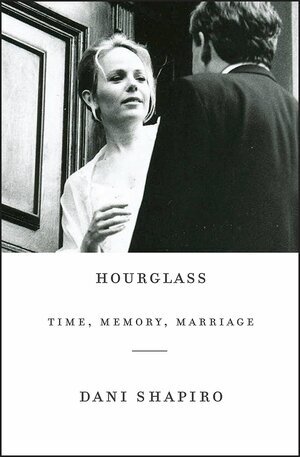
In the memoir department, I have to make special mention this year of Dani Shapiro — I reread Inheritance, her memoir about discovering a hidden truth in her ancestry, and then ALL of her other four memoirs as well as one of her novels. Hourglass, the memoir that focuses on her marriage, was my favorite, aside from Inheritance — which I still think is her best book so far.
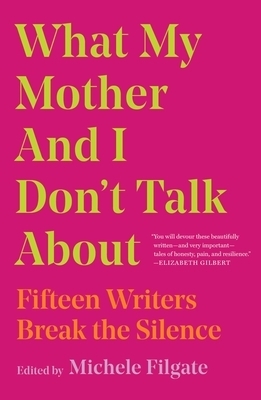
Another book that stood out was What My Mother and I Don’t Talk About, to which 15 contemporary writers contributed personal essays circling around that vital, but often non-communicative, relationship. I found myself wanting to read more by the writers included, and I’ve started already … we’ll see how far I get with that project.
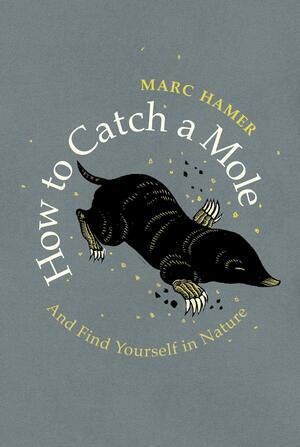
A title that was a bit more off the beaten path was How To Catch a Mole, which beautifully combined memoir, nature observation, thoughts on our changing culture and climate, and fascinating information about the strange life of that humble creature under our feet. I highly recommend it, even if you have no interest in catching moles!
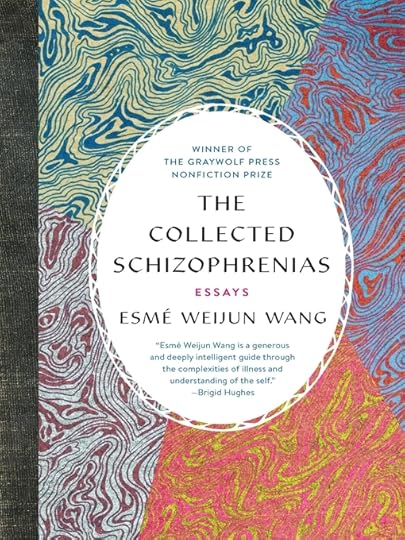
Some of the topics I gravitate to are mental health and brain science (Everything Is Fine, The Collected Schizophrenias, The Brain That Changes Itself), addiction, recovery, and body-mind integration (Drinking: A Love Story, The Recovering, The Wisdom of Your Body), art, culture, and books (All the Beauty in the World, Custodians of Wonder, Once Upon a Tome), theater and film (The Twelve Lives of Alfred Hitchcock, Making It So, The Kindness of Strangers).
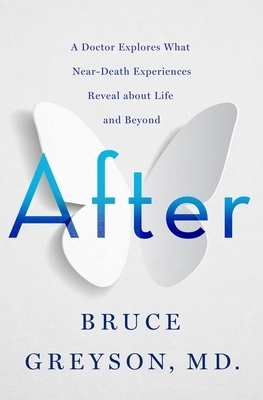
Compared to previous years, I did not do much spiritual reading this year, aside what was required for my spiritual direction training. But a book bridging science and spirit was After by Bruce Greyson, about a doctor’s study of near-death experiences. Greyson was and is not religious, nor a believer in the supernatural, but an inexplicable experience he had with a patient prompted him to investigate NDEs by gathering data from thousands of experiencers. I think he gives a rational and balanced treatment of the topic, valuable for broadening our minds beyond the limits set by materialism.
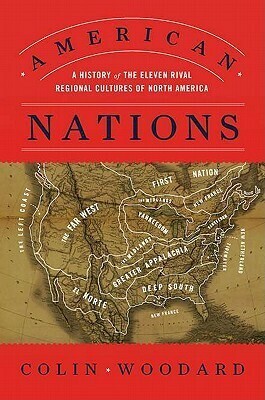
Other books from which I learned a lot were American Nations (how cultural schisms developed through the waves of European settlement in America), Falling Upwards (a whimsical history of “how we took to the air” through ballooning), and The Discovery of France (the wild and dangerous side of non-Parisian France, in the time when it was mapless and only partially civilized).
In fact, as I look back over these memories of a year of nonfiction reading, I think the overall theme to which I am drawn is “How are we split, and how can we come back together?” That’s the potential in reading for me: to restore wholeness. And I’m not giving up yet!
As for a book pairing, I’ve just recently come across this one:
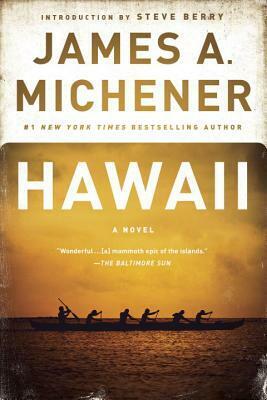
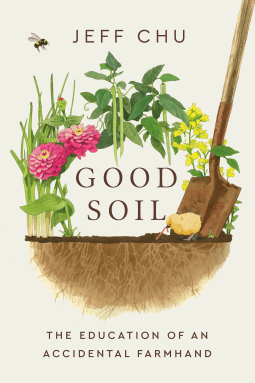
The connection? In Michener’s novel, some of the major characters are members of the Hakka ethnic group in China, who originally migrated from northern China to the Cantonese region, and remained a culture unto themselves. When some of them migrated to Hawaii as farm laborers, it brought a new element into the unique ethnic mix of the islands.
In Jeff Chu’s forthcoming memoir, we learn that his ancestry includes Hakka forbears, while he struggles with finding integration and peace within American culture. Engaging with the soil, through a farm-based program of the theological seminary he decides to attend, becomes a transformative experience.
As you can see, it’s been another incredible year of nonfiction reading, and I look forward to gathering more recommendations from you. What have been your highlights this year?
November 4, 2024
Witch Week Day 5: Magical short stories
Today, over at Calmgrove the Witch Week post is a discussion of Joan Aiken’s The Serial Garden, stories in which magic mixes with modern family life in a way that can be hilarious, creepy, or lyrical, or all of these and much more. I hope you’ll enjoy our lengthy but fascinating discussion, which includes my own memories of the first Armitage family story I ever read …
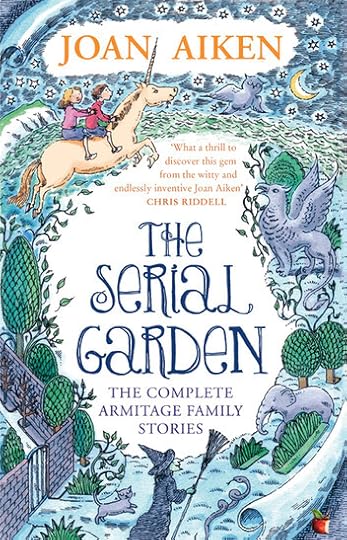
I thought this would be a good place to put in a plug for the e-book story collections recently published by Gateway in honor of Joan Aiken’s centenary. There are four of them, which thematically group a large variety of Aiken’s stories from all parts of her career. At just a buck or two per volume, they are an absolute steal!
Although it seems they might not be available from US retailers … you may need an account based in the UK or Europe. (I just change the billing country on my Kobo account, and use Paypal to pay. It doesn’t seem to matter where I actually am.)

If you can get around that hurdle, between these, The Serial Garden, and The Gift Giving (a recent collection of favorite stories published by Virago, also at an incredibly low price as an e-book) there is hardly any overlap, so with just a few volumes you can have a magnificent collection of stories to keep you entertained, surprised, diverted and charmed for hours. As they did me, when I read through them all not long ago.
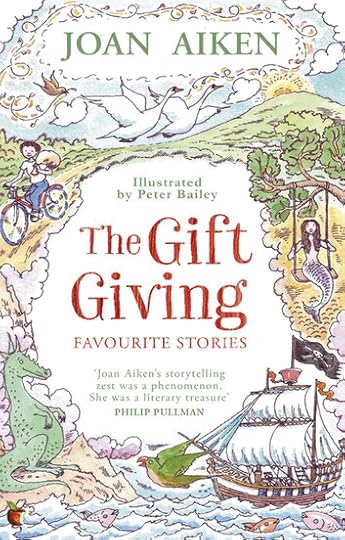
US publisher Small Beer Press has produced a version of The Serial Garden, as well as two collections of edgier stories marketed to adults, The Monkey’s Wedding and The People in the Castle. These are priced at a more normal rate, but also well worth it. Note that the stories in The People in the Castle overlap quite a bit with those in the Gateway collections.
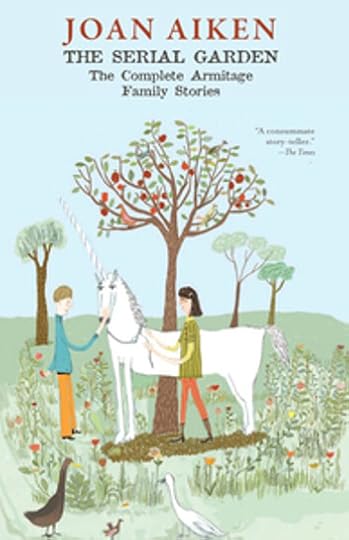
Do you have a favorite story, or collection, by Joan Aiken?
November 3, 2024
Month in Review: October 2024
I didn’t finish many books this month, partly because I was reading Hawaii by James Michener, a massive book of over 1000 pages. It flew by, though, and I loved learning more about the origins and history of those beautiful islands. Now I’d like to read more by this author of immersive historical fiction.
Have you read any other books by Michener? Which would you recommend?
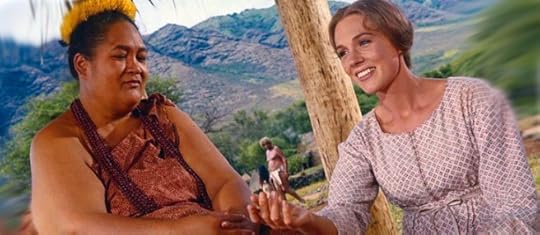 Julie Andrews as missionary Jerusha Hale in the movie version of HawaiiRead in October:
The Recovering
by Leslie JamisonThe Lily of Ludgate Hill by Mimi Matthews
Hawaii
by James A. MichenerFalling Upwards by Richard Holmes – Nonfiction Reader Challenge
The Wisdom of Your Body
by Hilary McBrideThe Cafe with No Name by Robert Seethaler, translated by Kate Derbyshire – Around the World, Austria
Julie Andrews as missionary Jerusha Hale in the movie version of HawaiiRead in October:
The Recovering
by Leslie JamisonThe Lily of Ludgate Hill by Mimi Matthews
Hawaii
by James A. MichenerFalling Upwards by Richard Holmes – Nonfiction Reader Challenge
The Wisdom of Your Body
by Hilary McBrideThe Cafe with No Name by Robert Seethaler, translated by Kate Derbyshire – Around the World, Austria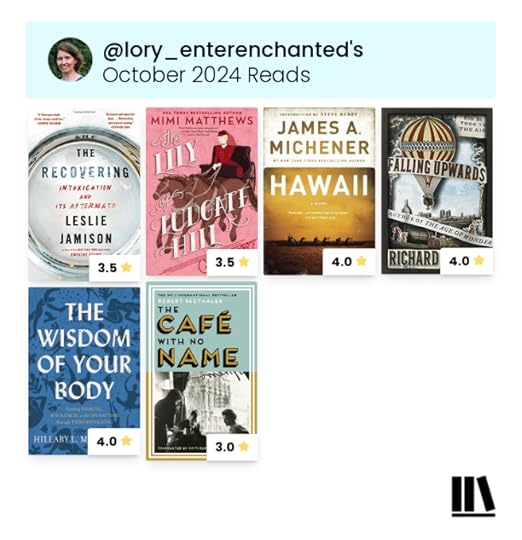 Language
LanguageLanguage study went by the wayside this month, as I spent most of my time speaking English! (See below.) However, I’m almost finished reading Momo by Michael Ende, which I hope to review for German Literature Month in November. I think this would the first time I’ve managed to participate.
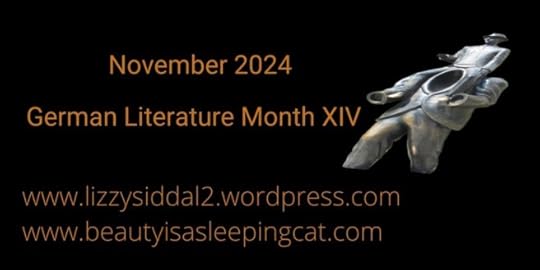 Life
LifeThe big event in October was my trip of a little over two weeks to the United States, first visiting my family on the West Coast and then friends on the East Coast (where I lived for more than 20 years, so it’s like a second home). It was wonderful to strengthen those heart-connections; much as I appreciate online and written communication, there’s nothing like seeing our loved ones in person.
Preparations for Halloween were in full swing, and while I continue to puzzle over the morbid sides of the holiday — why are Americans so preoccupied with gore and decay? — I enjoyed some of the more clever and magical displays people came up with. My favorite was a dragon that I met on my walk each morning, watching over the street from its perch.
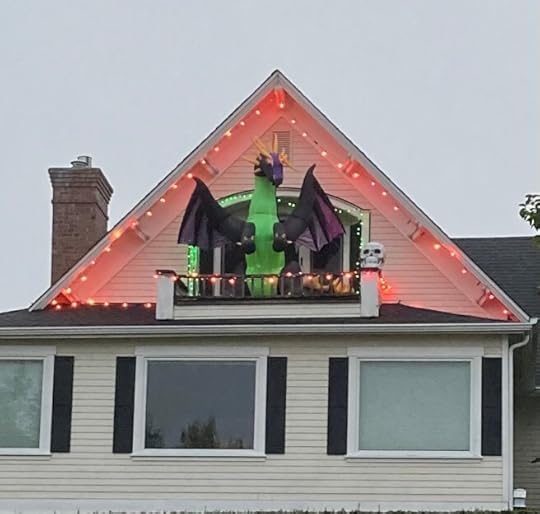
Some people are trying to celebrate Halloween in Switzerland — I saw a few children trick-or-treating as I drove home that evening — but nothing like these elaborate decorations. And I have to say I hope it doesn’t take hold. There’s too much Americanization as it is.
What was special for you this month?
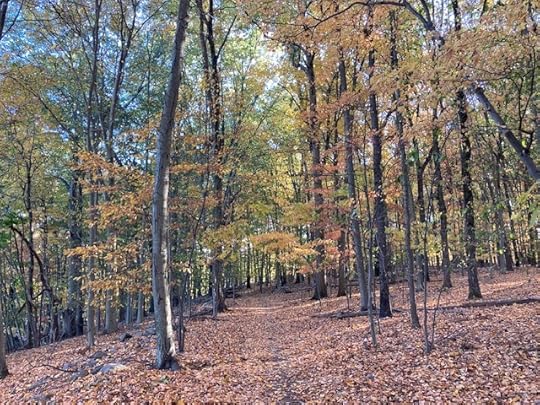 Glorious autumn color in the Northeast US
Glorious autumn color in the Northeast USLinked at The Sunday Post at Caffeinated Book Reviewer, the Sunday Salon at Readerbuzz, and the Monthly Wrap-up Round-up at Feed Your Fiction Addiction
November 2, 2024
Witch Week Day 3: My review of the Felix Brooke trilogy
Please head over to Calmgrove for my post about Joan Aiken’s Felix Brooke trilogy, an adventurous journey that can be enjoyed by readers of all ages.
Rare archival images are included, courtesy of Seven Stories museum in Newcastle, which has an unpublished archive of Aiken material. Please do give it a look!

October 30, 2024
Witch Week is here
Head to Calmgrove for the schedule. The theme this year is the wonderful works of Joan Aiken, in all their variety and splendor. I’ll be contributing on Saturday (the Felix Brooke trilogy) and Monday (our discussion of The Serial Garden) and will remind you of those posts, but there’s so much more. I hope you’ll join us!
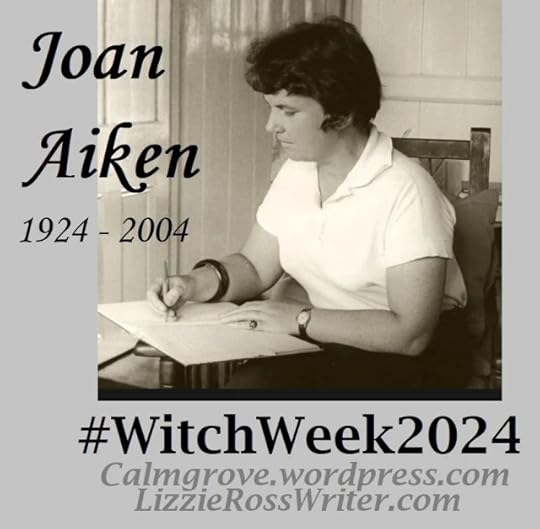
October 27, 2024
Nonfiction Reader Challenge: Falling Upwards
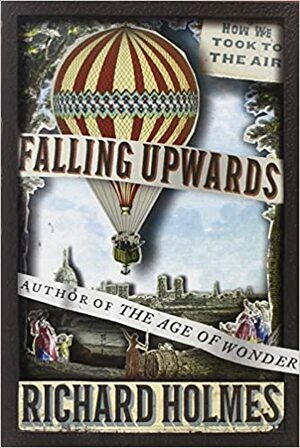
Hello there! I’ve been on a bit of an unannounced blog break, as I was off visiting family and friends in the US (my first time back in 5 years) and didn’t have time to do anything else. I did manage to fit in some reading: a book subtitled “How We Took to the Air” seemed particularly appropriate for the airplane, and would also count for the Transportation category in the Nonfiction Reader Challenge. And I’m so glad I took it along!
I loved Holmes’s The Age of Wonder, about science and scientists in the Romantic era. This book could be seen as an extended footnote to that one, focusing as it does on the romantic era of ballooning. Though it’s been superseded in our minds by the far more powerful and controllable technology of airplanes and space travel, Holmes reminds us that the dream of flying began with the simple balloon.
He also impresses us with the understanding that what today is a relatively safe novelty experience was at the time of its invention an awe-inspiring revelation, as well as often hazardous. Human beings were no longer bound by gravity! This gave rise to some exaggerated claims — that ballooning would spread peace and democracy everywhere by erasing the arbitrary boundaries between nations, for example. This, of course, did not prove to be the case.
Balloons did play a role in history, as they were used for wartime reconnaissance in the Civil War and for communication during the siege of Paris in the Franco-Prussian War. But their most important effect might have been on our imaginations, the expansion they wrought in our view of the world and our place in it. Holmes includes a wealth of literary examples, from Poe to Dickens to Verne and into our own times (though he regrettably omits one I think deserved consideration: the balloon that carries the Wizard in L. Frank Baum’s 1900 novel The Wonderful Wizard of Oz.) Ballooning evokes a daring journey that takes one into a strange land, dangerous and magical, possibly difficult or impossible to return from, and that is ripe material for storytelling.
Indeed, rising up into the air inspired an incredible degree of foolhardy recklessness in some aeronauts, who seemed to think overcoming gravity meant that they were now invulnerable to any other limitation, and were prone to wishful assurance that the wind they wanted at any particular moment would blow in the right direction! The stories of some of their disastrous journeys are painful to read, and could stand as a metaphorical warning for the ego-inflation of our industrialized Western culture. We, too, have taken off in a direction we now find hard to control, and seem to be headed for a crash landing.
However, those aeronauts who managed to stay a bit more sensible may inspire us with their bravery in the cause of science — meteorology and an understanding of the earth’s atmosphere began with them. The revolutionary discovery that gases could be weighed and some were lighter than air also meant a new direction in chemistry. To venture into the unknown, not recklessly but with careful, observant minds that remain open to discovery, is what allows us to rise into new realms through knowledge. Thus, we might expand our human capacities in a rightful way.
But the book ends with a particularly sad story about a doomed polar expedition, another case of scientific hubris, which put an end to romantic dreams of heroic exploration by balloon. The age of heavier-than-air flight was soon to begin. Still, the balloon, silent and wind-borne, tugs on our heartstrings in a way noisy airplanes and rockets can’t. I’ve never been up in one, but now, as long as there is strong assurance I’ll be able to come down again, I’m quite tempted to give it a try, ascending into unknown realms …
Richard Holmes, Falling Upwards: How We Took to the Air (Pantheon, 2013)
Read for the Nonfiction Reader Challenge — Transportation category
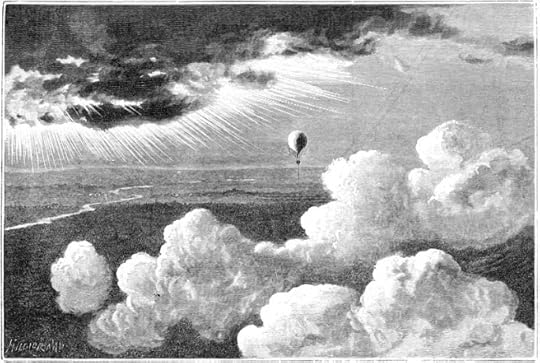 One of Gaston Tissandier’s evocative illustrations from “Travels in the Air”
One of Gaston Tissandier’s evocative illustrations from “Travels in the Air”
October 5, 2024
Month in Review: September 2024
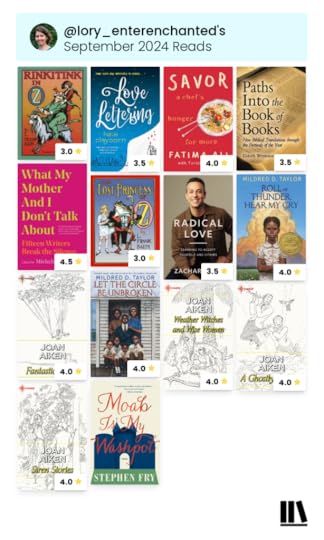
Lately I seem to alternate hard-hitting, emotionally wrenching reads with lighter, fantastical fare. This month was no exception, with two Oz books and a slew of stories by Joan Aiken filling in the latter role. On the heavier side, I was particularly impressed by Michele Filgate’s collection and want to read more by every author included in it. I also finally delved into Mildred Taylor’s powerful depiction of the evils of racism, as seen through the eyes of a child and her family in Depression-era Mississippi was another highlight — somehow I managed to miss these books growing up.
In other reading and blogging news, I posted thoughts about my summer-long read of Madame Bovary, and previewed a couple of wonderful new books, Better Living Through Literature and The Release. I hope you’ll check them out!
Here’s what I read in September:
Rinkitink in Oz by L. Frank Baum – OzathonLove Lettering by Kate Claybourn Savor: A Chef’s Hunger for More by Fatima Ali – Around the world, Nonfiction ReaderPaths into the Book of Books by Elspeth Weymann What My Mother and I Don’t Talk About , edited by Michele Filgate The Lost Princess of Oz by L. Frank Baum – OzathonRadical Love by Zachary Levi Roll of Thunder, Hear My Cry and Let the Circle Be Unbroken by Mildred D. Taylor Fantastic Fables , Weather Witches and Wise Women , A Ghostly Gallery, and Siren Stories by Joan Aiken – anticipating Witch Week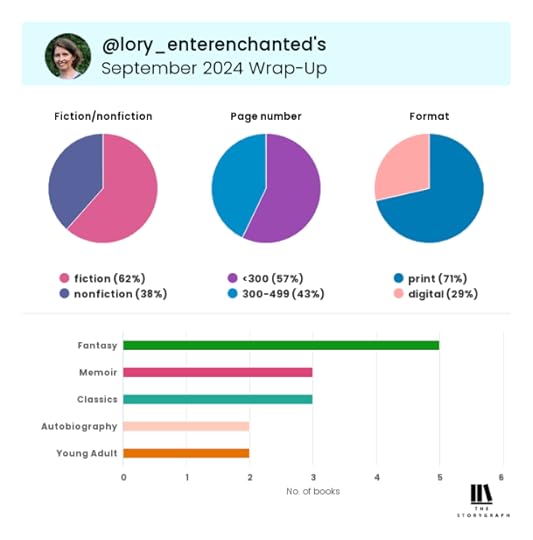 Language
LanguageI passed my French language test and am now eligible for permanent residence in Switzerland! That was a relief. However, now I have to switch gears and work on German, because I’m taking a course starting at the end of November that will be taught in that language. It’s a Red Cross training for certification as a healthcare assistant, but I hope it will also boost my language skills. For me, it works better to actually use language for something rather than just study it in the abstract.
LifePreparing to leave on a trip to the US (my first in over five years) has occupied a lot of my attention this month. As well as seeing my family — my main reason for going — I’m glad to be able to arrange a few events to help spread the word about my book, When Fragments Make a Whole. For those in the NYC area, here’s a weekend of sharing and writing that might interest you or someone you know.
September is my birth month, and I also shared some photos of my birthday trip to St Ursanne, a lovely medieval town. Here’s one more:
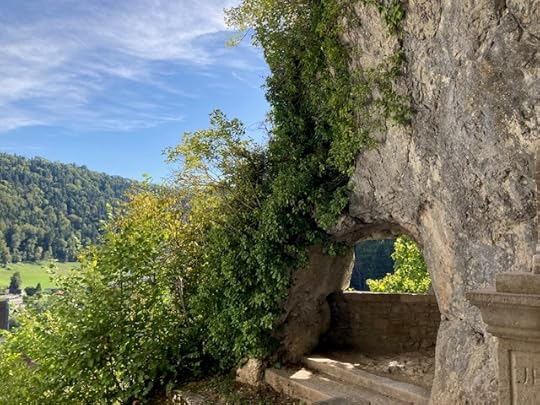
Linked at The Sunday Post at Caffeinated Book Reviewer, the Sunday Salon at Readerbuzz, and the Monthly Wrap-up Round-up at Feed Your Fiction Addiction
September 30, 2024
New Book News: The Release
Today is the release day for Elizabeth Jarrett Andrew’s new book, The Release: Creativity and Freedom After the Writing Is Done. Yes, we’re celebrating the release of a work that is about releasing work! Why is that topic necessary to write about? Well, as I have discovered myself, the process is not always easy, comfortable, or unmixed celebration and fulfillment. Often there are feelings of anxiety, insecurity, conflict, and disappointment when a book or other creative work is released to the public. And there can also be difficult feelings surrounding work that can’t be released for some reason. What to do with these emotions, in a healthy creative process?
I’ve been on the release team for this book and got to have a preview, and I have already found it making a difference in my own writing process. Andrew invites us to reframe writing as a gift and to consider ways the gift needs to move — whether it’s out into the world, or into and through the soul of the writer. She asserts that creativity does not end when the writing is done, but enters a new phase that can nourish and stimulate us just as much as the process of generating and revising work does. And she offers a wealth of practical suggestions as to how to encourage that to happen.
I hope to share a longer review soon, but for now here are a few favorite quotes from the book and an invitation to learn more. You can find more information and purchase links on Elizabeth’s website. Here’s to a great launch!
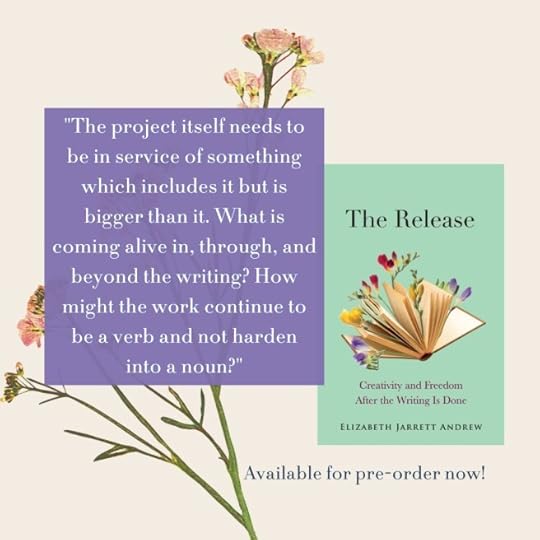
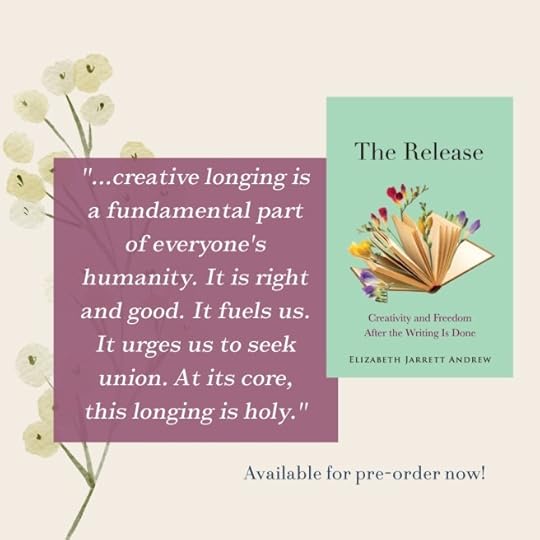
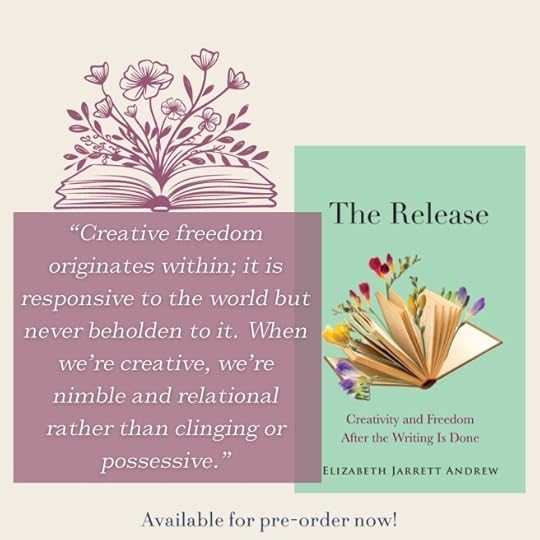
September 28, 2024
Nonfiction Reader Challenge: Savor
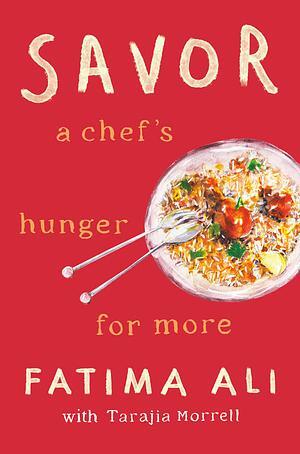
When I picked Savor as my book for the “Food” category of the Nonfiction Reader challenge, I thought I’d be reading mostly about food. I knew the author, a talented young chef, died far too early, but somehow I thought that before that point, the focus would be on more cheerful and tasty things.
I was wrong. Yes, this is a book with some fantastic descriptions of food, and of one woman’s journey toward becoming a great chef, but it’s much more a book about love and death and family and trauma and healing. It’s about the quandary of being caught between two cultures, wanting to bring them together in a great feast of celebration, while knowing well how violent are the forces of opposition. It’s about the excruciating pain of being betrayed by the people who should have been protecting you, and of loving people who don’t want you to be who you really are. It’s about ignoring things you don’t want to see, until it’s too late, and dealing with the consequences. It’s about the callous cruelty of our modern medical system, and about the human connections that can still heal in the midst of evil conditions. And in the end, it’s about going through the dark night of the soul, feeling abandoned by God, and the spiritual awakening to divine love, which enables us to forgive and be forgiven, trusting in whatever may come after the apparent end of life.
Not quite what I expected, but I felt humbled by Fatima’s courage, vulnerability, and honesty in sharing her story. She had wanted to write a different kind of book, one about traveling the world in her last year of life and sampling all the incredible food she had not yet tasted, but her illness derailed that dream. Instead, she typed and dictated her story for another writer to assemble, incorporating articles she’d written for Bon Appetit on learning her diagnosis. The two worked together for just one week before Fatima’s death. Her mother (who should really be credited as a co-author) then filled in more of the history from her point of view. This required courage and vulnerability on her part, as well, and although it was sometimes a bit jarring, and I wished for more of Fatima’s dynamic, authentic voice, the collaborative effort gives another flavor to the project — in some ways more fitting than if Fatima had been able to write it all herself. No one survives alone, no one is alone, even in death. The creation of our lives takes place in relationship, as cooking is also a creative engagement with many elements in relationship with each other.
So many things in Fatima’s story went against the expectations of her Pakistani heritage, and her mother and her family had to struggle toward acceptance, sometimes causing her and each other even greater pain. It was not usual for a woman to want to become a chef, a restaurant owner, a TV personality. It was not acceptable to resist the expectation of conventional marriage with a Pakistani man, still less to openly embrace romantic relationships with people of any gender. It was taboo for girls to speak up about experiencing sexual abuse. She did most of those things, and many more, a living challenge to the voices saying “you can’t do that.” And those around her were changed by the encounter, in ways that will continue to reverberate, her legacy living on.
Fatima had huge dreams about helping the hungry, supporting people marginalized by gender and culture, changing the image of Pakistan, sharing the food she loved. She didn’t get to do those things in the way she’d expected, but she did create this book. I think she has done her part in changing the world, by being herself, by speaking up, embracing life and entering death with a whole heart. Any of us can only aspire to do the same.
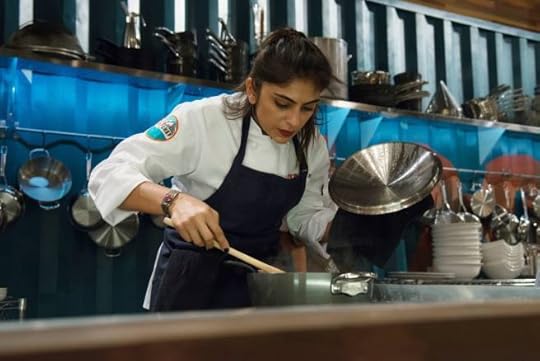 Fatima Ali cooking on the Top Chef show
Fatima Ali cooking on the Top Chef showFatima Ali, with Farezeh Durrani and Tarajia Morrell, Savor: A Chef’s Hunger for More (Ballantine, 2022)
Read for the Nonfiction Reader Challenge — Food category
September 26, 2024
#Ozathon24: An Oz Appendage
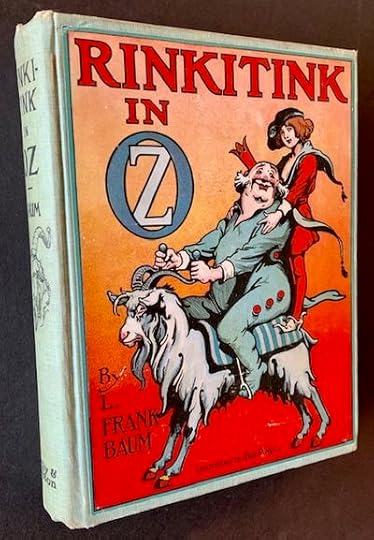
Rinkitink in Oz, book 10 in the series, is a book I never read as a child. My library didn’t have it, and I didn’t make an effort to seek it out, since I’d heard it “wasn’t really an Oz book.” In fact, it’s an unpublished, unrelated story that Baum wedged into the series by giving Oz some new neighboring countries and bringing in Dorothy as Deus Ex Machina at the end. It is not a bad story, and I wish Baum had been able to make it stand on its own and not bring in Oz at all. But his readers, like child-me, rejected non-Oz fare, so he conceded to that demand.
Until that abrupt ending, we get to enjoy the fairy-tale-like adventures of Prince Inga of the island of Pingaree, whose parents and entire people are stolen away by a vicious enemy. Inga manages to rescue them using three magic pearls that give him wisdom, strength, and protection. The comedy and suspense of the story largely hinge on these pearls, hidden in the pointy toes of Inga’s shoes, which get lost and then found again in various combinations. Eventually he is imprisoned by the Nome King, who has some dastardly trials for him.
Rinkitink is a jolly, fat king from another country who comes in for no apparent reason other than to offer comic foil to the earnest Inga, along with terrible verse. His bad-tempered goat sidekick Bilbil adds another flavor of comedy, probably — as with the verses — intended for the stage. There is an unfortunate racist slur near the end, when an interesting bit of magic is being done on Bilbil, and a “Tottenhot” is referred to as a lower form of human.
Otherwise, it was an entertaining enough, but I find myself forgetting the details almost at once. It is still the books I loved as a child that stick with me the most.
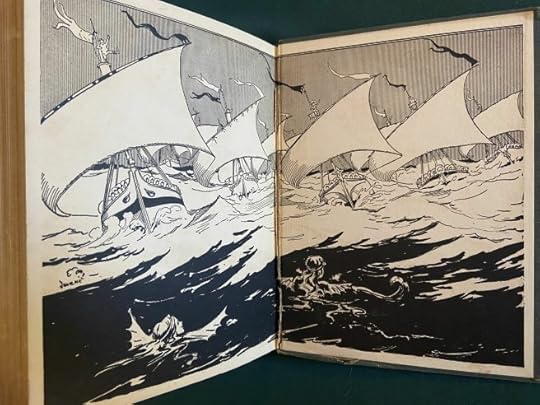 Endpaper illustration by John R. Neill
Endpaper illustration by John R. Neill

